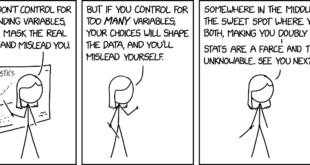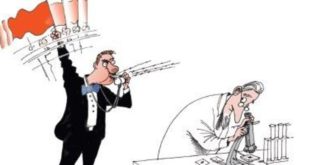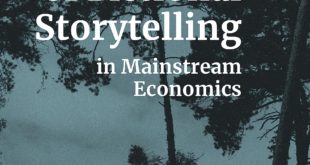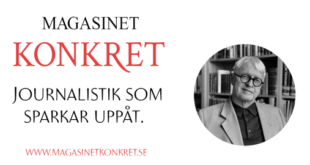Ignorability — a questionable assumption Researchers adhering to missing data analysis invariably invoke an ad-hoc assumption called “conditional ignorability,” often decorated as “ignorable treatment assignment mechanism”, which is far from being “well understood” by those who make it, let alone those who need to judge its plausibility. For readers versed in graphical modeling, “conditional ignorability” is none other than the back-door criterion that...
Read More »The dangers of too much control
The dangers of too much control You see it all the time in studies. “We controlled for…” And then the list starts … The more things you can control for, the stronger your study is — or, at least, the stronger your study seems. Controls give the feeling of specificity, of precision. But sometimes, you can control for too much. Sometimes you end up controlling for the thing you’re trying to measure … An example is research around the gender wage gap, which...
Read More »Scientific fraud
In 2022, the U.S. National Institutes of Health (NIH) placed a large bet on an experimental drug developed to limit brain damage after strokes … The gamble seemed warranted. Lab studies, most by a longtime grantee, prominent University of Southern California (USC) neuroscientist Berislav Zlokovic, had generated promising data. A small safety study of the drug, sponsored by a company Zlokovic co-founded called ZZ Biotech, was also encouraging. Because of its potential to...
Read More »Busting the natural rate of unemployment myth
Busting the natural rate of unemployment myth Almost sixty years ago Milton Friedman wrote an (in)famous article arguing that (1) the natural rate of unemployment was independent of monetary policy and that (2) trying to keep the unemployment rate below the natural rate would only give rise to higher and higher inflation. The hypothesis has always been controversial, and much theoretical and empirical work has questioned the real-world relevance of the idea...
Read More »‘New Keynesianism’ — more useless than ever
‘New Keynesianism’ — more useless than ever .Macroeconomic models may be an informative tool for research. But if practitioners of ‘New Keynesian’ macroeconomics do not investigate and make an effort to provide a justification for the credibility of the assumptions on which they erect their building, it will not fulfil its tasks. There is a gap between its aspirations and its accomplishments, and without more supportive evidence to substantiate its claims,...
Read More »Causal traps of statistics
Causal traps of statistics .[embedded content] Statistical reasoning certainly seems paradoxical to most people. Take for example Simpson’s paradox. From a theoretical perspective, it importantly shows that causality can never be reduced to a question of statistics or probabilities unless you are — miraculously — able to keep constant all other factors that influence the probability of the outcome studied. To understand causality we always have to relate it...
Read More »Here with me
.[embedded content]
Read More »Bad faith economics
Itzhak Gilboa, Andrew Postlewaite, Larry Samuelson and David Schmeidler (2022) describe a practice that … is not uncommon among theorists: “[O]ne may suggest a model with a descriptive interpretation in mind, but, when facing an aggressive audience, one might take a step back and rather than promoting the model as an explanation of a real-life phenomenon, present it as a ‘proof of concept’ or ‘merely an exercise’ in testing the scope of the standard paradigm. (p. 7)“ Think...
Read More »A winter’s tale
.[embedded content] Absolutely fabulous!
Read More »Nödvändig journalistik
Sedan några månader tillbaka är yours truly fast medarbetare på det partipolitiskt obundna, frihetliga och progressiva samhällsmagasinet Konkret. Mina artiklar finns att läsa här: https://magasinetkonkret.se/lars-syll/
Read More » Lars P. Syll
Lars P. Syll







